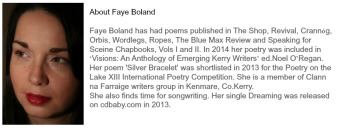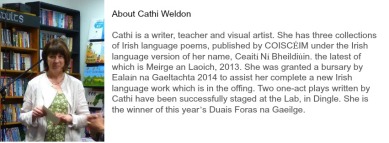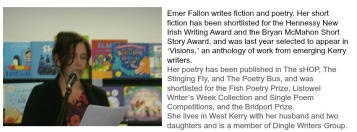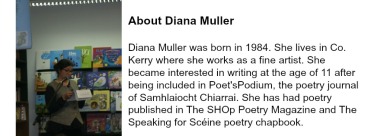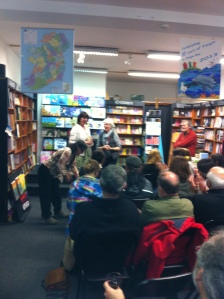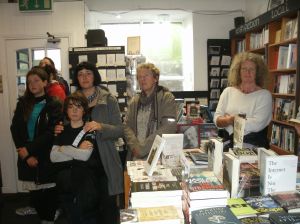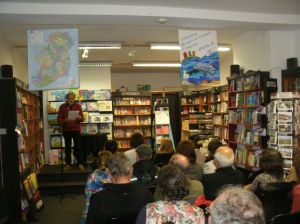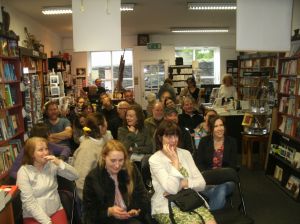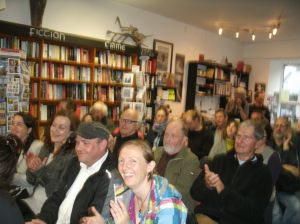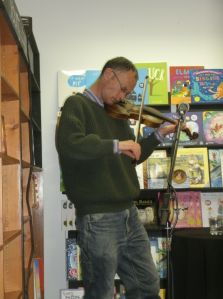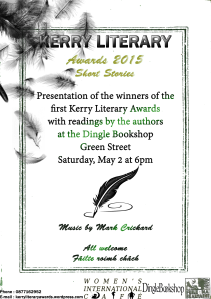“Pouvez-vous parler aux autochtones?” I asked the boy, hoping it was him.
I’d spent the better part of a week trying to locate him. It seemed no one wanted to acknowledge him. He was local, but had grown up too close to the edge of the jungle to be considered trustworthy. Eventually I found him working on a palm plantation.
He was small for his age, but then, why wouldn’t he be? Most Congolese children looked younger than they were. At fourteen he looked ten. The machete he used to cut at the palm trunks was half his height. Still he wielded it without trouble, one armed, his other having been amputated at the shoulder. I walked over and called his name, “Claude Baptise!”
He lowered the machete and turned to me. I introduced myself. I called myself a doctor and asked if he was the boy who could speak Aka. He nodded and said nothing. I asked if he would take fifty American dollars to be my translator and he nodded again, dropped his machete and followed me. He didn’t stop to tell anyone or collect his belongings, just walked off the plantation without looking back.
He was silent much of the time. After hiking for a day through the jungle he asked me what we were looking for. I told him we were seeking a legend.
Sinafasi didn’t trust him of course. When we met the old man at the edge of his territory he raised his bow and shouted something.
Claude turned to me, “He says I have to stay away,” he said in French.
“Tell him you’re my translator,” I replied. Claude rattled off something in Aka, but Sinafasi wouldn’t give an inch.
“I am Lendu,” Claude said. “He will not deal with me.”
“Tell him I could not find any other way to communicate with him,” I said.
He then spoke again to Sinafasi at some length. Sinafasi replied, loudly, enraged, he gestured widely as he shouted at the boy. Claude became visibly upset at this. He replied quietly, staring at his feet. After a long pause, the old man finally approached us, looking daggers at Claude the whole time.
“What did you tell him?” I whispered.
“I told him I had no weapons.” Claude said, holding out his good arm so that Sinafasi could inspect him. Seemingly satisfied, Sinafasi then turned to me and spoke.
“He said he will lead you because you have paid, and you are a friend, but that I must walk behind him and must not sleep near him, or speak to him, unless it is to translate.”
I nodded, and the old man turned and began to walk into the rain forest.
After following him in silence for some hours Claude asked his second question. It was the same as the first.
“Ce que vous cherchez?”
“Un lac,” I told him.
“Pourquoi?”
I hesitated, wondering if I should risk frightening him and losing his services. Still, I thought, what’s the harm in telling him? He has nowhere else to go.
So I told him the story as I had been told. That somewhere in the jungle was a lake, a small lake, more like a pool really, and that it was guarded by ghosts.
“Les fantômes?” He snorted derisively, but there was a tremor in his voice.
“Yes.” I told him that the ghosts that guarded the lake looked like people but behaved as though they were moving through the world without seeing it at all. I told him that the waters of the lake were said to have magical powers and that if you bathed in it, it would make you immortal. He wanted a definition for “Immortal”. I told him that it meant you live forever.
“No need to eat or drink?” He asked.
“I suppose not,” I said.
“So what do you live for?” He asked.
“I don’t know,” I replied, smiling, “Maybe you just live.”
We walked on in silence through the wet vines. After a while he spoke again.
“Would you still get hungry?” He asked.
“I don’t know. I don’t suppose you would, but that’s not the point Claude. I don’t believe that the waters have magical powers, but sometimes there is a grain of truth in these stories. These forests have many plants in them that can be used as medicine, and very few doctors have been able to study them. Maybe there is a lake, and some trees grow near it with certain chemicals in their roots or something like that? If I can get a sample of the water we may find that it can cure all kinds of diseases.”
“AIDS?”
“Maybe.”
He shrugged and walked on.
The night fell suddenly. In minutes the forest grew loud, every beast and bird under the canopy waking up to forage and hunt. We made a fire. Claude and I sat on a plastic tarp. With one last sour look Sinafasi disappeared into the trees to find a place to sleep, somewhere far away from Claude.
The boy lay upright against a large rock, unwilling to lay his head where insects might crawl into his ears while he slept. He watched Sinafasi’s retreating back with a frown.
“Why does he hate you so much?” I asked him. “You are clearly no threat to him.”
“La guerre,” he replied again. “The Lendu, my tribe, killed his people, many of them… Most of them, he told me. He said that Les Effaceurs chased his family through the jungle and killed them.” He swallowed thickly. “He said that they killed them, chopped them up and – ate them.”
With the war still fresh, an open wound across the face of the country, a conversation like this in any part of the Congo was a minefield. I had heard rumours of “Les Effaceurs”, The Erasers, clearing land for palm oil plantations and mining operations.
The Pigmy tribes had never been treated well. They were used as slaves in Claude’s village, a favorite target of ethnic cleansing. The Congolese didn’t trust them, thought they could perform magic, that they were evil. They were forever caught in the crossfire of other’s skirmishes, bearing the brunt of an anger they did not deserve or understand.
I had thought, foolishly, that there was nothing that could shock me anymore.
I stared into the darkness above, alert to the constant movement high up in the canopy, the forest as busy and populous as city. A shrill howl cut into me and I heard Claude inhale sharply. Little luminous eyes glittered down at us all night.
It was Sinafasi who made peace, eventually. His anger seemed to decrease slightly. Maybe It was the fact that Claude walked dutifully behind and obeyed his instructions.
Whatever it was, it manifested on the third day when we stopped at a stream. We had to cross the remains of an old Biakka bridge. The water below was deep and brown. Sinafasi crosses nimbly, in seconds, and I followed, less surefooted, but I had experienced these bridges before. Claude, however, would not cross.
He stood on the bank and stared at the rickety vine bridge in horror. He shook his head. “Je ne peux pas!”
“Of course you can!” I shouted back. “Just climb it like a ladder!” I realised then that without both arms crossing the bridge would be nearly impossible.
“Can you swim?” He shook his head, obviously terrified. Of course he can’t.
I was at a loss. He had to cross the bridge. He had no way back and he certainly couldn’t stay where he was.
“Claude! Just try it!” I cajoled, guiltily.
“I’m afraid,” he called back to me, shaking his head, his eyes wide. “I won’t do it.”
I was about to shout again, but Sinafasi spoke first, calling out to the boy, gesturing at his own right arm. Claude nodded and replied, shame faced.
Sinafasi walked back across the bridge, Claude took a step backward, but Sinafasi reached out his hands, speaking softly. Claude hesitated for a long moment, then closed his eyes and reached for the old man’s hands with his one. Sinafasi grabbed Claude’s wrist and walked backward across the bridge.
I let out a breath of relief when they reached the bank. Claude stood shaking, his knees knocking together. The old man said something to him and he opened his eyes and took a deep breath. Sinafasi touched the scarred stump at the boys shoulder and muttered something. Claude stared at him, then said one word. Sinafasi nodded, as though it confirmed something for him. He turned and continued on into the Jungle, Claude and I followed slowly.
“What did he ask you?”
“What? When?”
“Just then. He asked you something, it was a question. I could tell.”
“He asked me about my arm,” Claude replied, then picked up his pace and
walked ahead of me.
That night Sinafasi sat with us around the fire. He seemed comfortable now, sitting beside Claude on a log, singing an old song.
Claude asked him something. The little man looked up into the canopy and thought for a moment before replying. Claude then turned to me.
“He has seen the ghosts, the ones that guard the lake. Once, when he was young.”
“What are they like?” I asked him.
Sinafasi spoke in a whisper, almost chanting, glancing this way and that, as though afraid that ghosts were listening.
“He says that they look just like people, but they are not, that they are blind and deaf, that they cannot feel pain and that they have no memory. He says that they are lost, but they do not know that they are lost. They have forgotten that they exist.” Claude asked him something, then turned to me with a smirk.
“He says that they do not get hungry or need to eat.”
On the fifth day Sinafasi suddenly stopped walking, he cocked his head to one side and smiled, he hushed us and beckoned us to his side. There was a noise, crunching, footsteps? He parted the leaves, exposing a small clearing.
A tribe of gorillas sat in the undergrowth grazing on leaves.
Sinafasi crouched down low in the bushes and motioned to us to do the same. He began to whisper, then sing under his breath.
“He says that when his people die they are born a second time here, as gorillas. He says that these are his ancestors,” Claude whispered in my ear. “He’s singing their names.”
The old man began to cry as he sang.
I woke that night to silence. I looked up and saw a human figure standing in the moonlight near our camp, facing away from us. I reached out carefully and shook Sinafasi awake. The old man cast and eye at Claude, sleeping against a tree. The boy continued to sleep as we rose and crept slowly towards the man. We approached and he didn’t move until we were only a few yards away.
The figure then turned as we approached, I felt no chill up my spine, no feeling of supernatural dread. He stood there as naturally and solidly as the trees around us. He stared with the blank gaze of any animal that has never seen a human before, but without the fear, or curiosity.
I knew then what I had done in coming here. I hadn’t only been led here by my guide and interpreter. I had led them right to the place that generations of Baikka and Lendu had not approached. The dark core of their forest.
It didn’t register our presence like an animal would. It simply turned away and walked with an odd lumbering gait into the undergrowth. I called Claude and he, vigilant even in sleep, started awake. He looked around, grabbed a stick, and followed us.
The figure ambled a few steps onward and we saw the silver water of the lake. We saw them, dozens of them, standing around the edge like sentinels, their eyes reflecting the moon. They did indeed look human, but I knew that they weren’t, not anymore. Immortal, had I ever really defined that word? Claude had come close to pinpointing it: no need to eat, never being hungry, living forever, no matter what you did, no matter what happened to you.
But if there is no need to survive, what need is there for memory or identity, tribe or home? In the hollow eyes were centuries of forgetting, centuries of wandering the woods with no purpose, long years of emptiness, until they were perhaps drawn back by some instinct to the edge of the pool, their birthplace.
They have forgotten that they exist.
Claude and the old man exchanged a look. And I saw relief in their eyes as they understood, before I did, the nature of that lake.
And God help me, I tried to cry out a warning as Sinafasi closed his hand around Claude’s, but no sound came out of my mouth as they walked into the water together.
